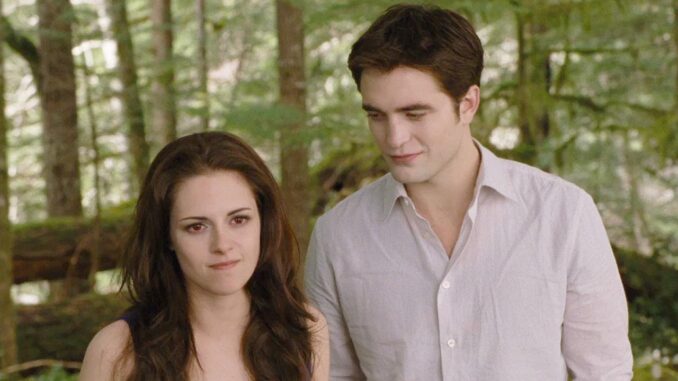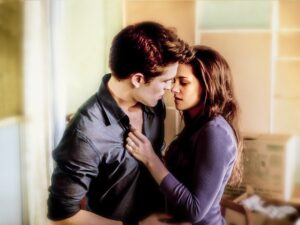
Kristen Stewart Says Studio Tried to Make ‘Twilight’ a ‘Movie for Kids’ and ‘Didn’t Want’ the Actual Book: ‘When the F— Are’ Bella and Edward Smiling Ever?
Stewart caught some flak from critics at the time for her moody screen acting, but she told Rolling Stone she was just keeping her interpretation of Bella true to the book series. Some execs wanted Bella to be perkier and bright-eyed, but Stewart just didn’t agree.
“The studio was trying to make a movie for kids,” Stewart said. “They didn’t want what actually was the book. When the fuck are [Bella and Edward] smiling, ever?”
Stewart’s “Twilight” years are forever associated with her relationship with Robert Pattinson, but she’s not one to look back on that era so many years later.
“Rob and I can’t just keep talking about that shit, because it’s fucking weird,” Stewart said. “It’s like if someone kept asking you — I mean for literally decades — ‘But senior year in high school?’ You’re like, ‘Fucking A, man! I don’t know!’”

Stewart opened up to Variety last month about reflecting on her “Twilight” era so many years removed from it. She said she’s started to see the film saga’s queer undertones with age.
“I can only see it now,” Stewart said. “I don’t think it necessarily started off that way, but I also think that the fact that I was there at all, it was percolating. It’s such a gay movie. I mean, Jesus Christ, Taylor [Lautner] and Rob and me, and it’s so hidden and not OK. I mean, a Mormon woman wrote this book. It’s all about oppression, about wanting what’s going to destroy you. That’s a very Gothic, gay inclination that I love.”
Stewart is returning to theaters next month with the A24 crime thriller “Love Lies Bleeding,” directed by Rose Glass. The movie earned strong buzz at the Sundance Film Festival last month. Stewart plays a gym manager in small town America who falls for bodybuilder (Katy O’Brian), only to learn her new love has gotten wrapped up in the criminal underworld overseen by her father (Ed Harris). Stewart told Rolling Stone that she first bonded with Glass over the industry’s misguided interest in movies with strong female leads. Their film would deconstruct such an archetype.
“What does that mean?” Stewart asked about strong female roles. “It’s bullshit. It means that we’re not actually letting women define themselves. It’s the assumption that we need to be empowered by the people deciding who gets to have perspective, that we have to provide something aspirational. It’s the lowest-hanging fruit there is.”
